빨래
A musical overwhelms audiences in a special way. Harmonies consisting of impressive lyrics and melodies present earnestness appealing to audiences. The musical ‘Laundry’ kept its seat over 15 years in Daehak-ro, accomplishing over 5000 performances. This musical conveys a common story which everyone might relate to by ordinary lyrics and lines. All the characters live in Seoul, but the amount of time they’ve lived there varies from 2 to 45 years. They indicate how they live in the moment through dialogs, monologues, and songs of people living away from home such as the song ‘How Long Have You Lived in Seoul?’ Let’s move on to the musical ‘Laundry’, which we can sympathize with, because it is also the way we live in the moment.
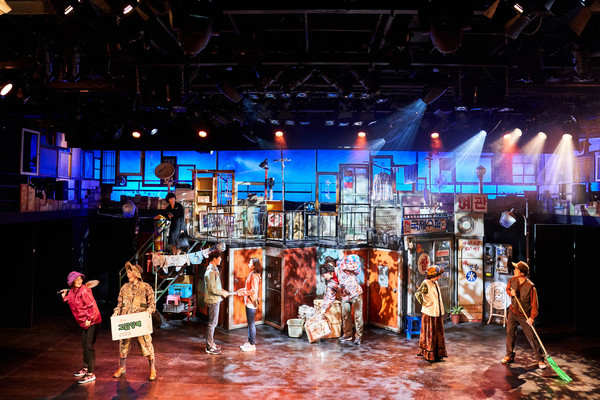
Characters
Seo Na Young: A 27-year-old woman who came to Seoul five years ago from Gangwon-do.
Solongo: A man who came to Seoul five years ago to make his dream come true. Being an illegal immigrant from Mongolia, he doesn’t get paid well and is at a risk of being kicked out of his apartment.
Owner Hal Mae: The owner of the building where Na Young and Mama Hee Jung lives. Due to confidential reasons, she has been living in Seoul for 45 years.
Mama Hee Jung: An independent woman whose’ charming personality makes the town amiable.
Gu Shi: Mama Hee Jung’s lover who always has a fight with Mama Hee Jung.
Bread[1]: A CEO of Je Il library, where Seo Na Young is currently working.
Michael: A friend of Solongo from the Philippines.
Female Worker: An employee who is in charge of attracting people to the bookstore.
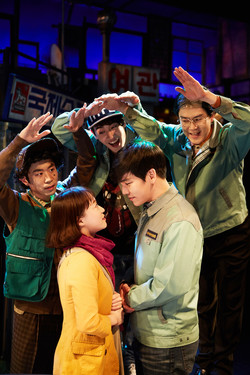
Synopsis
Na Young, who moved to Seoul with a dream of being a writer five years ago, remains in Seoul by working in a bookstore. As she went up to the roof to hang her laundry, she met a Mongolian guy, Solongo, who lives next to her house. They gradually become each other’s supporter in the tough world, as Solongo struggles from the reality of life as an illegal immigrant and Na Young faces an unfair layoff in her workplace. Also, as Mama Hee Jung and Owner Hal Mae comfort Na Young, the residents of the single rooms become closer. The neighbors, sharing their worries and stories of their lives, earn confidence.
The Story of Us Living the Moment
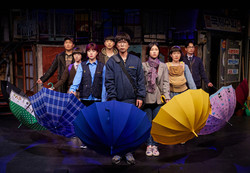
‘Laundry’ presents narratives of each character and invites the audience into the story. The audience is busy crying, laughing, and sympathizing with the characters. Particularly, Na Young who goes through and witnesses a wrongful dismissal in the bookstore, and Solongo who meets a setback of being expelled from his house, share their stories through songs. The lyrics and melodies evoke empathy and has the audience wiping their tears away. Additionally, when the life of illegal immigrants is revealed in the lyrics they sing, “Words I have learned, it hurts! Don’t hit me! Give me money!”, it contrasts with the lively melody. From this, audiences can indirectly feel how insecure their lives are. Besides, Owner Hal Mae seems to be strong using tough language but has a personal issue of taking care of a disabled daughter, and Mama Hee Jug and Gu Shi’s marriage story relates to people in modern society. All these characters’ stories are shown through songs and performances. Inside the familiarity in which people encounter in their life, the audience sympathizes with and be consoled from the story of ‘us’, living today. Unlike other musicals or plays, there isn’t a dramatic love story or conflict, it is about people gathering and creating a reliable, comfortable place. The most interesting part is the ending of the musical. It ends with characters maintaining their normal, ordinary lives. The characters’ lives don’t drastically change in a good way, and the musical ends with a message that life goes on, which paradoxically makes the musical special. The reality of protagonists living their lives just like us makes us relate to them and accept our bittersweet life.
Specialty of Laundry
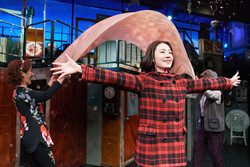
Laundry, also the title of this musical, is also the meaning of characters’ own methods of communicating and resolving their concerns. The characters come together as they meet on the roof where they do their laundry. Seeing their neighbors crying on the rooftop, they sympathize with them, and release their stress sharing what happened that day. As you can see in the lyrics ‘Let’s wash off the stained despair, let’s blow off the dusted concerns’ from the song <Dear Daughter!>, laundry is their own way of beating stress that can sweep away the wearisome days. Doing the laundry when they are angry and exasperated gives them the power to sustain their lives. Also, they say that tears of sorrow would get parched as the wet laundry dries as time flows. Furthermore, the laundry reminds characters of their moms and hometowns. The miserable reality and the softly trampled dreams contradict the genuine purpose of them coming to Seoul. The whole songs about Na Young’s dream becoming dull, Owner Hal Mae’s daughter, and the exhausting life story of Mama Hee Jung eventually make the audiences eyes full in tears.
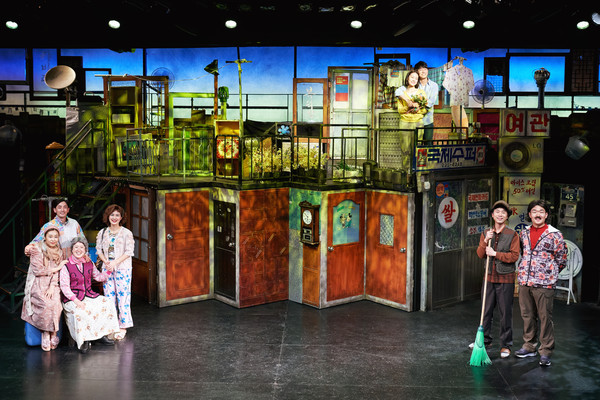
As it is said that few people who live in Seoul were actually born there, as many people move to Seoul. The storytelling conveying the hardship of people living in Seoul and how the characters get over it in their own way; doing the laundry touch the audiences’ heart. Also, it encourages audiences to cheer the characters’ fresh start. Are you carrying your concerns by yourself, or do you always embrace the painful mind in your own? Like Na Young, ‘let’s do the laundry, wipe out the blot of yesterday, brush off the dustiness of today, and iron the wrinkle of tomorrow. Let’s put up the clean pressed tomorrow and live our moment!’
Date: 2022.06.10~2023.01.29
Place: Uniplex building 2, Daehak-ro
Running Time: 150 minutes (Intermission: 15 minutes)
[1] The reason why his nick name is Bread is that one day when he was young, he was eating some bread on a bridge. At the moment a bird came to him and cried, “Make a book store! Achieve your dream!” To remember the moment he had a dream, he told this story to employees of the bookstore again and again. Therefore, the employees gave him the nickname, Bread.

